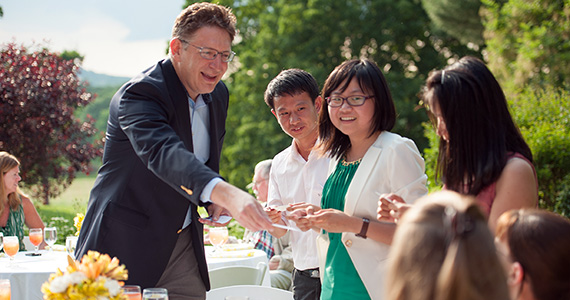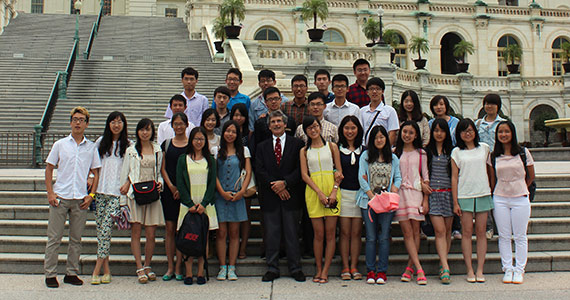
President Jeffrey Herbst hands out his business card to visiting students from Xiamen University during a welcome luncheon at Merrill House. (Photo by Erica Hasenjager)
Personal tour of the New York Stock Exchange? Check. Daily treks up the hill three times a day from 110 Broad Street? Check. Lectures from some of Colgate’s most accomplished professors? Check. This summer, 29 students visiting campus from China’s Xiamen University enjoyed an authentic sampling of the Colgate experience.
The exchange program, the brainchild of President Jeffrey Herbst and Cheryl Long, associate professor of economics, was started in an effort to foster a closer relationship between Colgate and Xiamen and introduce the students to a liberal arts education.
“The liberal arts approach to higher education is very little known in China because all universities in China have a more research-oriented approach,” Long said.
Long hoped that this program would be different than other exchange programs that only focus on English-language instruction and sightseeing. Instead, the Colgate program combined classroom-based discussions in English with a series of lectures from Colgate professors that helped the Chinese students better understand American society. Topics ranged from economics and the financial system to history, sociology, and foreign relations between the United States and China.
“From the very beginning we didn’t feel that the program needed to be merely about academics. We felt we should expose them to as much as possible about the U.S.’s culture and values,” Long explained.
Long, who has attended and taught at both Chinese and American universities, encouraged the Chinese students to engage in more dialogue with the Colgate professors. The in-class discussions between teachers and students and the small class size – two distinguishing features of Colgate – took many of the Xiamen students by surprise.
Several students were simply amazed at how the teachers, Shana Walden and Bethany Reichen, could remember their names.
Lee Liu, a 20-year-old studying economics at Xiamen, was excited about having the opportunity to communicate more with his teachers. “In China, each class is like a lecture and the students obey what the books teach, and then you remember it and do your homework. But in America students and teachers are like friends. They just communicate about their topic and people can have a lot of different opinions. It’s a good way to develop creative thinking. I like this kind of teaching better.”
Sharon Zeng, a public finance major, added, “You do more presentations here. I think it’s very useful for a job. The teaching is much more interactive.”
When the students were not in the classroom, they enjoyed sightseeing in Niagara Falls and Cooperstown as well as trips to New York City and Washington, D.C. Because many of the students were economics majors, they were offered personal tours from Duncan Niederauer ’81, CEO and director of NYSE Euronext, and Rob Jones ’72, senior advisor at Morgan Stanley. In Washington, D.C., the students were welcomed by Alan Frumin ’68 P’07, parliamentarian emeritus in the U.S. Senate.
After coming from Xiamen, which has roughly 38,000 students and is located in a major city in southeast China, the village of Hamilton was a bit of a culture shock. However, the students adjusted quite well and took a liking to the close-knit community.
“The people here are so friendly and their thinking is more diverse,” Liu said.
While mingling with current Colgate students, giving presentations to Hamilton’s Rotary Club, and celebrating the Fourth of July in the village, the students experienced the breadth of the local community.
When asked to sum up his experience thus far, Mike Lu, 20, kept it short and sweet – “Colgate is a great place and I love it.”
The summer exchange program, which ran from June 29 to July 20, was only the first step in the memorandum signed by Herbst and Xiamen President Zhu Chongshi. Long hopes to see faculty visits, joint workshops, conferences, and more exchange programs that involve Colgate students visiting Xiamen.
“I hope that the two countries and their people can have a better understanding of each other. I think the most important way to have this happen is through cultural exchange. That is the only way to have a long-lasting connection,” Long said.
